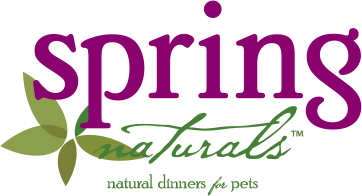
Vegan Diet for Your Pet – Cool, or Cruel?
If you feel strongly about the environment and cruelty against animals, that’s a great thing. Animal cruelty is nothing to joke about, and at Spring Naturals, we feel that deeply because we love all animals, no matter their species or size. However, one conundrum that sometimes arises is when vegan or vegetarian pet-owners decide to adopt a pet.
You’re vegan, but the pet you want is supposed to be an omnivore. So, what happens next?
Is it okay to feed your dog or cat a vegan diet, or would that be cruel? In today’s blog, we want to go over this issue and answer your questions.
Omnivores Can’t Be Vegan
Omnivores must be omnivores. So, it is not ‘cool’ to limit your pet to a vegan diet. Such a diet will starve them of essential nutrients and affect their health in horrible ways. Feeding a cat or a dog vegan food and forbidding meat can be tantamount to animal cruelty.
This is especially true when it comes to cats, because their bodies are adapted for a carnivorous diet and therefore, cats are unable to digest plant material well. So, not only must cats be omnivorous, but their diet must be largely made up of meat and meat products
In the case of dogs, you may be able to get away with a diet that’s somewhere in between. For example, dogs and even wolves can eat eggs, berries and grass to fulfill their dietary requirements (if they cannot obtain what they need from meat).
Dogs have gradually adapted to a diet that’s less meat and more plant starch. They have a specific kind of gene that enables them to digest these, and this is part of what has enabled them to be domesticated as early as they were – they were lured to prehistoric campfires by humans offering them food that wasn’t necessarily meat, and was therefore novel and fun.
So, while you can feed a dog a diet that contains a large amount of vegan or vegetarian products, they still require meat to obtain all the nutrients they need. In the case of cats, they absolutely need meat.
How Veganism Harms Cats and Dogs
We aren’t saying that they need to eat meat simply because they like the stuff – if you deprive them of it, they will not be able to gain essential nutrients, and that will adversely affect their health. Veganism can actually harm dogs and cats, and here’s how.
Cats are carnivores and their bodies are adapted to that way of life. Their GI tract and metabolism are adapted to eating meat and don’t handle plant based items well, even if they imitate meat. Cats can’t digest plant material well, and require essential nutrients that are only present in meat.
So, depriving a cat of meat would starve them of essential nutrients, and as their bodies aren’t designed to allow for the consumption of large amounts of plant-based foods, they may not be able to eat much else and may suffer severe health consequences as a result. Imagine not getting the nutrients you need from food, and not being able to consume food that your body agrees with. It doesn’t sound like fun, does it?
In the case of dogs, things are a little different. They can digest plant starch, so it isn’t cruel per se to feed your dog a largely vegetarian diet. However, in order for them to go fully vegetarian, you will have to be dedicated and potentially spend a lot of extra money on health and nutritional supplements and vet bills.
Meat contains a lot of beneficial elements that vegan food simply doesn’t have. You may be able to supplement it by using certain vegan foods, but the ratio of it required may not be feasible.
Pets That Can Be Vegan
If you feel passionately about veganism or vegetarianism and can’t see yourself with a pet that eats meat, you don’t have to give up hope just yet! While a dog or cat may not be suitable for you, there are other pets that can eat vegan food. Here are some of them:
- Rabbits – Bunnies will happily thrive on a vegetarian or vegan diet. In fact, eating any meat, eggs or even dairy can be harmful for them, as their bodies are not adapted to eating meat and they have a sensitive GI tract. Rabbits eat primarily hay, pellets and vegetables, but can have the occasional treat here and there – fruits and such.
- Guinea pigs – If you want a low-maintenance, fuss-free pet that can be fully vegan, guinea pigs are your best bet! These spunky little critters will happily thrive on a vegan diet. They feed on pellets and hay and love the occasional bit of fruit or vegetable as a treat. They, too, like bunnies, can’t tolerate animal products or meat.
- Certain birds – Like the idea of birds chirping and singing happily in your home? Parakeets and parrots are a joy to have around, and they don’t need any meat or animal products! Parakeets do enjoy the occasional piece of boiled egg, but it isn’t necessary unless you have a mama bird – those need a meat or egg-based protein boost.
- Chickens – Tired of pets leeching off you and want something that’s a little more productive and “pays for its keep”? We’re joking, but you’ll admit that chickens are rather productive. They will give you eggs, turn your compost, and you can use their poop to fertilize your garden – all of this in return for an almost fully vegan diet! They will want to eat beetles and worms while scratching around in your garden, but that needn’t bother you directly.
- Reptiles – Certain reptiles, like the Green Iguana can live on a fully vegetarian diet. No need for crickets or other gross bugs! You can feed them most fruits and vegetables, as long as they are fed a proper balanced diet that contains all the nutrients they need to thrive. Their diet can be a little tricky to get right, but they certainly don’t need meat, so that’s one major benefit!
- Other possibly vegan pets include mice, hamsters, gerbils, and certain vegetarian fish. Most of these pets are small and low-maintenance, and will thrive on a strictly vegan diet. So, you can choose from between these options if you want a pet that can be 100% vegan or vegetarian.
Cruelty-Free Food for Cats and Dogs
So, now you know that dogs and kitties can’t be vegan, and that forcing them to eat vegan food is cruel. You also know a number of pets that can, indeed, be vegan or vegetarian, to be more in line with your lifestyle.
However, what if you have your heart set on a particular animal that happens to be a dog or cat? Maybe you’ve fallen in love with a furry friend you rescued, or maybe you have already adopted, and are reading this article after the fact. Do you need to give up your lovely little baby?
No. There is an option that pleases both you and your pet – and that is the world of eco-friendly, cruelty-free food.
Certain brands sell ethical dog and cat food that’s better for the environment. If you are willing to compromise on the vegan front for your pet’s health but want the reassurance that comes with cruelty-free food, these have you covered.
From free-range chickens and sustainable meat farming practices to paper and cloth-based food bags – these brands use a variety of practices to ensure that their product is good both for your pets and for the environment.
Spring Naturals products are created from free-range, farm-raised animals that have lived their best life. We truly believe that your pets deserve the best, and so we’ve created something that is, in our opinion, the very best you can find. More on that below.
Spring Naturals – Honest Nutrition
You want the best for your pets, and so do we. At Spring Naturals, our passion is to create pet food that’s healthy, natural, and of high quality. So if you have furry friends that need meat and meat products in their diet, don’t settle for second best – give them Spring Naturals!
We don’t use meat-meal or filler, or high-starch ingredients that lead to obesity. Our kibble is healthy and flavorful, including market-fresh superfoods such as quinoa, blueberries, spinach and carrots.
We provide recipes for dogs and cats, including a specially formulated senior recipe for dogs. In addition, we believe that everyone deserves to have a happy, healthy, well-trained pet, so we have lots of resources on our website that will help you learn more about your pet’s health and dietary needs.

Post a Comment!